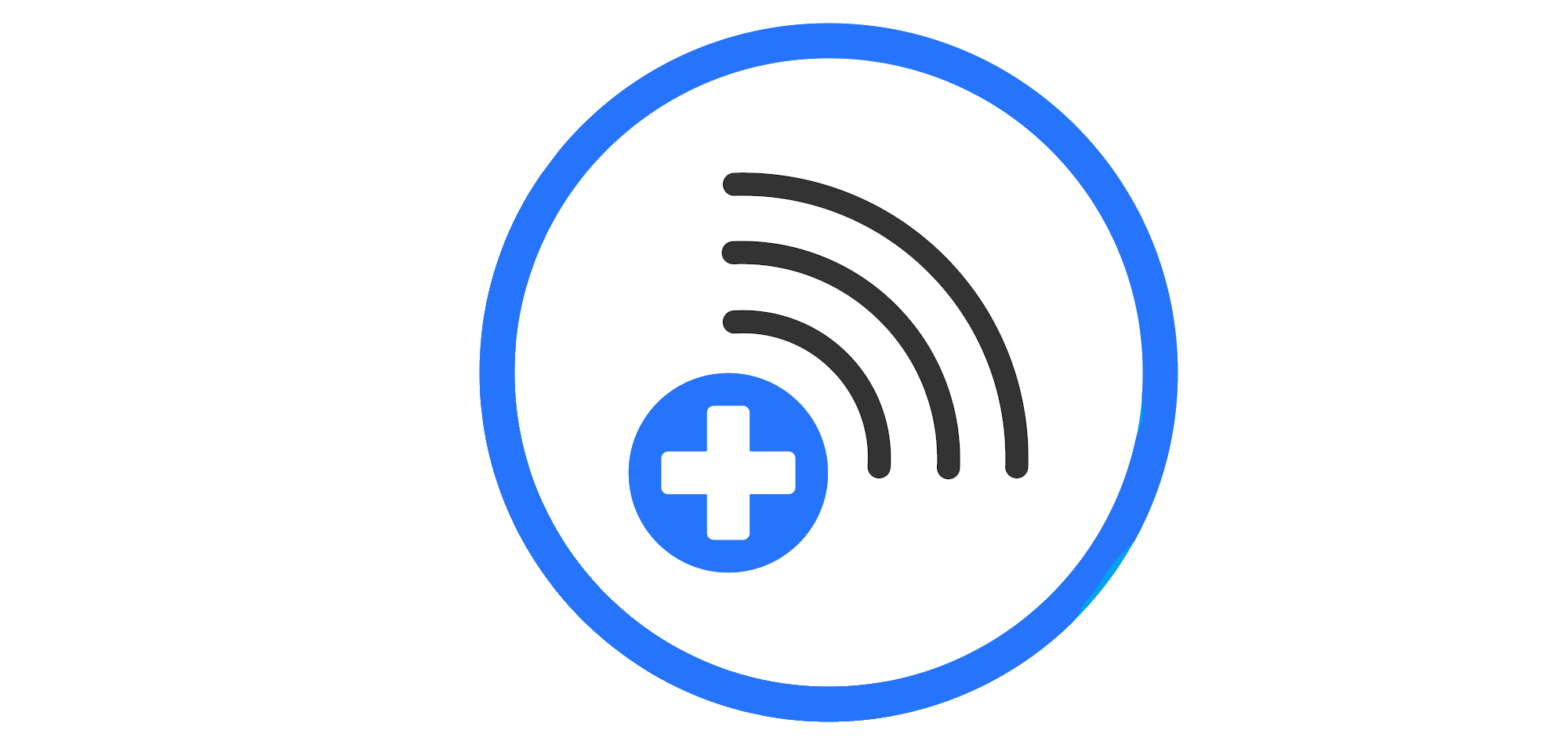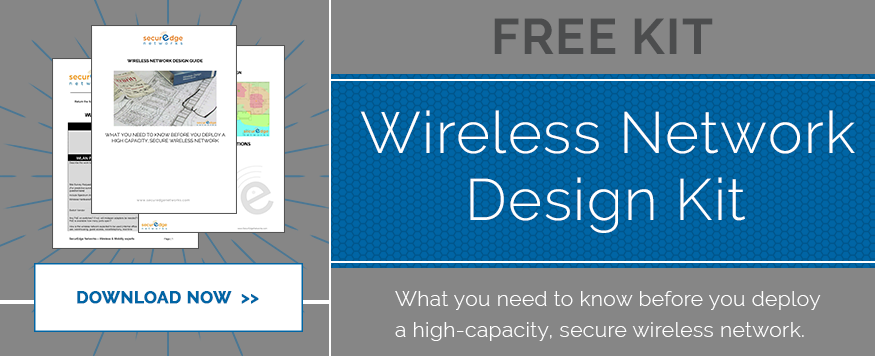
Reliable, secure WiFi is a utility. In no other industry is this remarkably more clear perhaps, than in healthcare, where the number of WiFi devices and wireless technology has become an intrinsic part of the day-to-day.
From the waiting room to the lab and everywhere in between, patients, faculty and staff depend on a reliable WiFi connection, designed for mobility and security to get them from point a to point b without wavering. To build such a network requires industry specific knowledge, a clear visual of the coverage area and an estimate of the daily average users and wifi devices connecting to the network. At SecurEdge our wireless network engineers have designed and deployed WiFi service in the healthcare industry for over a decade. Our approach is always design for security first, but for hospitals and health providers, there is an extra hurdle to overcome: HIPAA.
HIPAA compliance is established to protect the sensitive health data of patients. As medical records move to cloud platforms like EPIC, accessibility and accuracy of patient history, lab results, prescription orders and vital tracking become easier and more manageable, but also more easy to hack. That is why it is paramount to implement a wireless network that provides secure WiFi service on all fronts. If you’re unsure about the status or you hospital WiFi and HIPAA compliance, consider this:
Hardware
The foundation or your wireless network is the hardware. Having outdated equipment can be detrimental to the safety and accessibility of your network, even if you are maintaining regular software updates. As technology continues to evolve, staying up-to-date on your wireless hardware can be a difficult and expensive task, as the average lifespan for your wireless infrastructure is around 3 years.
With WiFi as a Service, your hardware will be maintained for the duration of your contract and then completely refurbished when the time comes to update, at no added charge. This is one of the most important and effective ways to ensure that your WiFi service is secure and compliant with HIPAA laws.
Design
Wireless network design is crucial to the success of your WiFi service and can make or break your wireless performance and security. SecurEdge will pre-configure your hardware before deploying it on your site, ensuring that you are getting the right design the first time.
Some things to consider when designing the network is coverage and capacity needs. Having a solid idea of your coverage space (high-density areas, floor plan, indoor-outdoor spaces, building materials, etc) are paramount to design and implementation. Access Points (AP) come in a variety of flavors, each intended to serve a specific coverage area. Choosing the right access point and installing it properly greatly impacts WiFi service coverage as well as network security. Many healthcare sites dealing with HIPAA compliance issues are suffering poor design, and knowing what materials you need and how to install them is the first step towards security and compliancy.
Additionally, your APs and firewalls will need to be configured to provide secure and reliable WiFi service as patients and staff move about your coverage area. This is called Mobility, and at SecurEdge, we adopt a mobility-first mentality. Mobile WiFi devices like wearables, tablets, phones and medical equipment rely on your network to perform and transfer valuable information. Configuring load-balancing into your network design will allow your APs to intuitively share your capacity needs among the hardware devices to prevent one AP from becoming overloaded and potentially failing. Load balancing is incredibly important to meeting HIPAA regulations for your WiFi network as an unbalanced network creates security risks.
Another important design factor for creating a secure WiFi network is implementing Role Based Access Control. RBAC is something we talk a lot about here at SecurEdge, because it's one to the most important and effective ways to provide a secure wireless experience for everyone on your network. RBAC is the process of segmenting your traffic and assigning different permissions to your users. In a healthcare environment, you should create a separate network access for your computers and medical devices. Separating these device and restricting user access to this network will help protect sensitive patient information and records. Additionally, you can set up a Guest Network for your patients and guests so that they can connect to the WiFi and enjoy streaming and network services without interfering with coverage.
Software
As important as having the right hardware and design is, it is equally important to keep the software of your network updated. SecurEdge offers network management through the cloud, so you can track software updates, see you wireless infrastructure in real-time, troubleshoot potential threats and get valuable insights into your network usage. You can rest assured that your wireless network is always running the latest versions of software and that any problems that occur will be communicated with you in due time, reducing security threats and improving patient experience overall.
Troubleshooting
With SecurEdge WiFi Cloud manager you’ll get access to vital tools that will alert you when there are problems with your WiFi service and allow you to view your wireless network infrastructure in real-time and troubleshoot potential problems. See your coverage map from your cloud portal and monitor the health of your access points, controllers, switches and firewalls. Heat Maps show you the density of your network usage across your coverage area and allow you to target exactly where performance issues are occurring so that you repair the issue more quickly.
Performance Management
Knowing how your network is operating can provide powerful insight into how to manage your network and therefore provide a more secure wireless network for your patients and staff. Performance management sensors from SecurEdge can be deployed on site to measure your WiFi performance on the device level and report findings to your cloud manager. Simulating an enabled WiFi device, the sensor will execute operations like loading web pages and video, downloading content and crawling search engines, looking for weak spots in your WiFi service and sending you live detailed reports.
Managed WiFi Services
Most clients in the healthcare industry have a dedicated IT team working diligently to provide secure and reliable coverage to the faculty and staff and troubleshoot problems as they occur. However, even for a large, experienced team, this is a massive undertaking, as coverage areas typically span multiple buildings, floors and rooms. Managed WiFi services from SecurEdge help lighten the load for your IT team, by sending weekly and monthly health updates to your IT techs, providing 24/7 network monitoring with alerts when threats or WiFi problems are detected, and offering standard Tier 2 level support ticketing to help troubleshoot issues if and when they occur.
Designing a wireless network infrastructure for the healthcare industry is one of the most complicated and delicate process as the devices and users relying on the network are critical to public health and safety. SecurEdge has over a decade of experience designing for hospitals and have the industry specific knowledge to design, deploy and support a HIPAA compliant network. If you are questioning the security and compliance of your Hospital's WiFi service or want to talk to an expert about troubleshooting or designing a new network, contact us!





![How Much Does WiFi as a Service Cost? [Free Quoting Tool]](https://techgrid.com/hubfs/Calculating-WiFi-Budget.jpg)